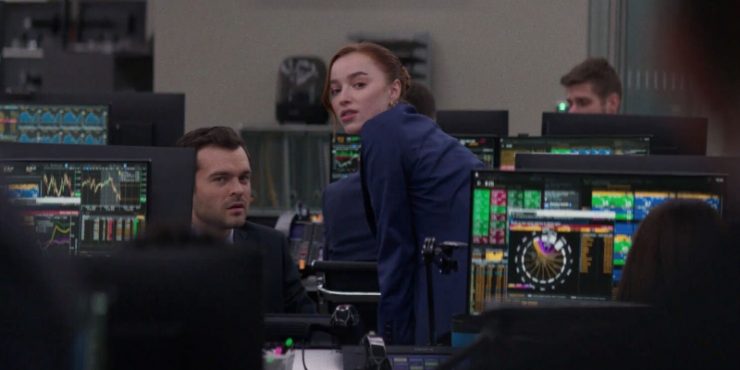There’s no way to say this without sounding derogatory: Fair Play feels a lot like television. That statement is more a reflection on the resources with which television drama is gifted than about Chloe Domont’s debut feature, which is actually pretty good. Domont has cut her teeth on television, directing for shows like Suits and Billions. Fair Play exists in the same cutthroat corporate universe of those shows, where the quest for wealth and power forever undermines anything like personal relationships. Domont’s film also has a hint of Adrian Lyne to it; the provocative cocktail of gender dynamics and sexual ferocity stirred together into something explosive. Fair Play‘s surprises smack of the kind of gambit a streamer might pull to make you choose their app over Hulu or Netflix.
The film is sufficiently sexy, centering on two young professionals in the financial sector horned up by the adrenaline a major New York City hedge fund firm that makes them work so hard they have no choice but to play hard after hours. Emily (Phoebe Dynevor) is a stock analyst alongside Luke (Alden Ehrenreich) at a legendary firm run by a ruthless man named Campbell (Eddie Marson, in perfect scoundrel mode). Their passionate love affair is held under wraps since it’s against company policy, but that doesn’t stop Luke from proposing five minutes into the movie. There are risks to be had, but Luke doesn’t mind; they can be open about their relationship, he explains, once they’ve both climbed the ranks and can’t be told no. This is always the endgame at a place like this: follow the rules until you arrive at a place where they no longer apply.
Their arrangement gets turned on its axis when a promotion is up for grabs and it’s Emily who gets the job, and not Luke. Initially, Luke acts supportive, even if it isn’t very convincing. Emily is apologetic, and quickly vows to get Luke promoted as well, now that she’s got power to wield. But the reality is more complicated. For one, Campbell is indifferent to Luke’s professional prospects. More importantly, Luke is immediately unmoored by Emily being his boss. Taking orders from his secret fiancé is a situation he’s never mentally prepared for. As Emily tries to balance her performance in her new job with keeping Luke content, tension rises, escalating from insinuations to accusations and eventually violence. Emily is not the archetypal icy social climber willing to dispatch those who don’t benefit her, but Luke’s simmering resentment brings out a competitive edge that only makes matters worse.
Domont’s script leans heavy into its melodrama, a choice that I actually admire, even if the film’s conclusion does descend into histrionics. It seems to speak directly to similar corporate erotic thrillers of the 80s and 90s, an array of hit films that cashed in with frank sexuality and twisty plot lines. Those movies were often about the helplessness that professional men felt in the face of sexual women, and as such, accusations of misogyny frequently surrounded the discourse around them, for better or worse. Fair Play uses the aesthetic of a movie like, say, Disclosure but not only chooses to foreground its female protagonist, but truly underlines how destructive a weak, insecure man can be. Luke’s affable charm wears quickly when forced to face the reality of making less money than his girlfriend, and Domont doesn’t waste time trying to protect his feelings.
The movie’s observations about gender dynamics can be a bit pat. Its glimpses of toxic workplace culture don’t really bring anything new to the table. If the performances of Dynevor and Ehrenreich weren’t as good as they are, I can imagine that Fair Play would feel pretty overwrought. There are certainly times when it feels pretty overwrought regardless. Emily is a far cry from Siobhan Roy. If anything, she seems to be more fixated on making people happy than anybody with any degree of Wall Street success ever has. Her attempts to maintain Luke’s ego vacillate between naive and desperate. Dynevor has a tricky role to play here. The suggestion that Fair Play makes is that she is not yet the monster that she is destined to become, and Dynevor doesn’t play Emily as Long Island Machiavelli – she’s a monster that is made.
Dynevor’s performance seems a remarkable likeness of what a young professional would be today: overly committed, emotionally inexperienced but a quick learner. She’s young enough to think that she has something to prove to the men in charge, but smart enough to use that arrogance against them. Her instincts as a stock speculator feel preternatural, but that proves to help little against the fragile feelings of a dejected boyfriend. Ehrenreich plays Luke perfectly, a man born on third who lacks the knowhow to get to home plate. Ehrenreich doesn’t shy away from his character’s pathetic nature, his perpetual fear of career mortality, the way he substitutes charm for personality. Ehrenreich makes Luke a real person, but makes sure that we see all the sides of them.
It’s hard not to return to my original thought, of Fair Play feeling like television. On FX, a story like this could probably excel in its pyrotechnics. It’s story – Adrian Lyne run through the filter of 2023 corporate feminism – might feel more palatable in 43-minute chunks. As it stands, this is well-directed. Even as a feature debut, one can tell that Domont is anything but a first-time filmmaker. The movie’s final scene is something out of midcentury drama, a suspenseful sequence filled with the kind of mordant symbolism that would seem embarrassing in a worse movie. In Fair Play, it comes off as slightly pretentious, biting off a little more than the script can chew. I think we have real talent in the forms of Dynevor and Domont, even if one hopes that they eventually come back together for something better.
Written and Directed by Chloe Domont










